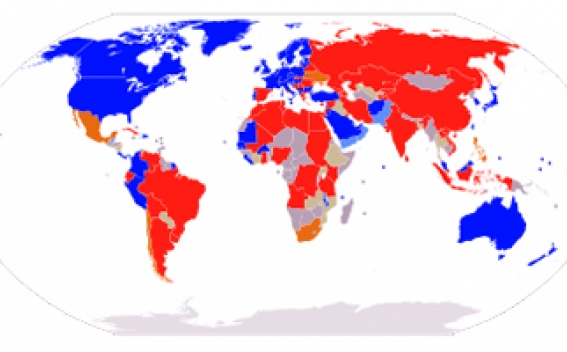Montevideo Convention

From the series of "Internationally recognized small states"
There are many international documents according to which a territory can be recognized as a state. The definitions in those documents are various, but there are also common concepts. For example, a group of communities may be considered a state, which has its territory; population, symbols, customs and its own political system. A state attributes also include population, state apparatus, taxation system. Besides a state has a special characteristic, sovereignty, which is expressed not only within the border of a state but also in its international activities. Among special characteristics are also legal system, state symbols and its recognition by other states. If we take
Let’s examine one of those legal acts – the Montevideo Convention. This Convention is one of those few international documents, in which features of a legal image of a state are defined from the perspective of international public law. The convention was signed during the 7th pan-American conference in the capital of
A state recognition was viewed in a new light in the 20th century, when the international legal system acquired systematic and logical order. In 1919, during the formation of the League of Nations, when various international conferences were organized, the coordinators of those events appeared in a very difficult situation when deciding whom to invite to a conference and whom to include in the
The problem was to be solved during the international conference in
a) a permanent population;
b) a defined territory;
c) government;
d) capacity to enter into relations with other states.
 According to the 3rd article of the Convention the political existence of a state is independent of its recognition by the other states. Even before its recognition a state has the right to defend its integrity and independence to maintain it and to contribute to its prosperity, and consequently to organize itself as needed, to legislate upon its interests, administer its services, and to define the jurisdiction and competence of its courts.
According to the 3rd article of the Convention the political existence of a state is independent of its recognition by the other states. Even before its recognition a state has the right to defend its integrity and independence to maintain it and to contribute to its prosperity, and consequently to organize itself as needed, to legislate upon its interests, administer its services, and to define the jurisdiction and competence of its courts.
According to the 7th article of the convection "The recognition of a state may be express or tacit." There is also another term "implicit recognition", when the states, which have recognition, establish economic, cultural or political relations with the states having no international recognition. Thus
In this case what is meant by unrecognized state? Who decides how many states should recognize unrecognized state, for it to become a subject of international legal system? What is the upper limit of the number of states recognizing state having no international recognition for it to be able to become a member of the UN? Why then is it stated that to become a UN member state it is enough to be a peaceful and follow its Charter. In this context can the internationally recognized state of
Be that as it may, the issue of a state recognition or non-recognition is disputable from the perspective of international documents and it leaves many questions open. For example, if a non-recognized state is not a member of UN yet, does it cease to have all those features of a state enumerated in the Montevideo Convention? Is in this case the article of the Convention which states that "The political existence of the state is independent of recognition by the other states" is not applicable for an unrecognized state?
Of course not, as the unrecognized state de-facto exists and the world will recognize it sometime in the future as it was in the case of Kosovo, especially, when there are separate European states, who accept the principles of the Montevideo Convention. For example
By Karin Stepanyan
Other materials on this subject
- Baku Again Blames Armenia for "Wanting to Freeze" the Negotiation Process It should be mentioned that Baku regularly comes up with such statements.
- Relations Between Turkey and Israel will be Restored. Ankara Claims "The teams made progress towards finalizing the agreement and closing the gaps, and agreed that the deal will be finalized in the next meeting which will be convened very soon,” the ministry said.
- Transnistria Appeals to Putin to Act as Guarantor "We found ourselves blocked, gripped in a vice, both from the side of Moldova and Ukraine. This is for the first time in 25 years," Valerian Tulgara, chairman of the Union of Moldovans of Transnistria...
- European Free Alliance: Party of Emerging New States in Europe Of course this is a great advantage for Artsakh people as it will allow them to make a step forward from fighting alone to a group fight for their right to determine their own future.
- China Blocks Taiwan’s bid AIIB According to the Beijing’s Taiwan Affairs Office, China is open to "gather more opinions" that will help to ultimately find an "appropriate name" for Taiwan joining the bank.
-
 17:08
17:08The regular session of the Anti-corruption Policy Council takes place in Jermuk
-
 15:05
15:05The Prime Minister sends congratulatory messages to the supreme leader of Iran and the President of Iran
-
 11:11
11:11Armenia sends earthquake aid to Turkey
-
 10:43
10:43Commemoration of the Pontiff St. Sahak Partev
-
 09:16
09:16Some roads are closed and difficult to pass in Armenia
-
 19:55
19:55Phone conversation of the Foreign Minister of Armenia with the U.S. Assistant Secretary of State for European and Eurasian Affairs
-
 18:30
18:30Prime Minister Pashinyan and President Khachaturyan meet
-
 18:20
18:20Ararat Mirzoyan with Co-Chairman of the OSCE Minsk Group of France Brice Roquefeuil
-
 17:01
17:01Humans could land on Mars within 10 years, Musk predicts
-
 16:45
16:45France, US urge 'immediate' end to Nagorno Karabakh blockade
-
 16:01
16:01Blockaded Nagorno Karabakh launches fundraiser to support quake-hit Syria
-
 15:59
15:59Earthquake death toll in Turkey rises to 18,342
-
 15:43
15:43Ararat Mirzoyan Held a Telephone Conversation with Sergey Lavrov
-
 15:06
15:06French president rules out fighter jet supplies to Ukraine in near future
-
 14:47
14:475 Day Weather Forecast in Armenia
-
 14:44
14:44President Vahagn Khachaturyan wrote a note in the book of condolences opened in the Embassy of Syria in Armenia
-
 14:20
14:20Azerbaijan’s provocations impede establishment of peace and stability – Armenian FM tells Russian Co-Chair of OSCE MG
-
 12:57
12:57France representation to OSCE: Paris calls on Azerbaijan to restore freedom of movement through Lachin corridor
-
 11:40
11:40Command of Kosovo forces highly appreciated preparation of Armenian peacekeepers
-
 10:16
10:16The United States withdrew from sanctions against Syria for six months the provision of assistance after the earthquake
day
week
month
Humidity: %
Wind: km/h

